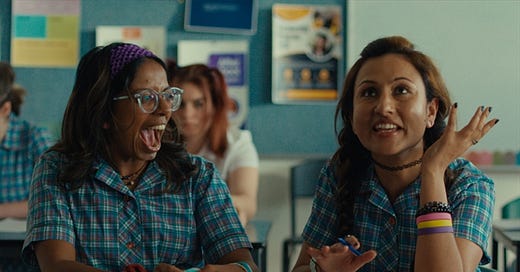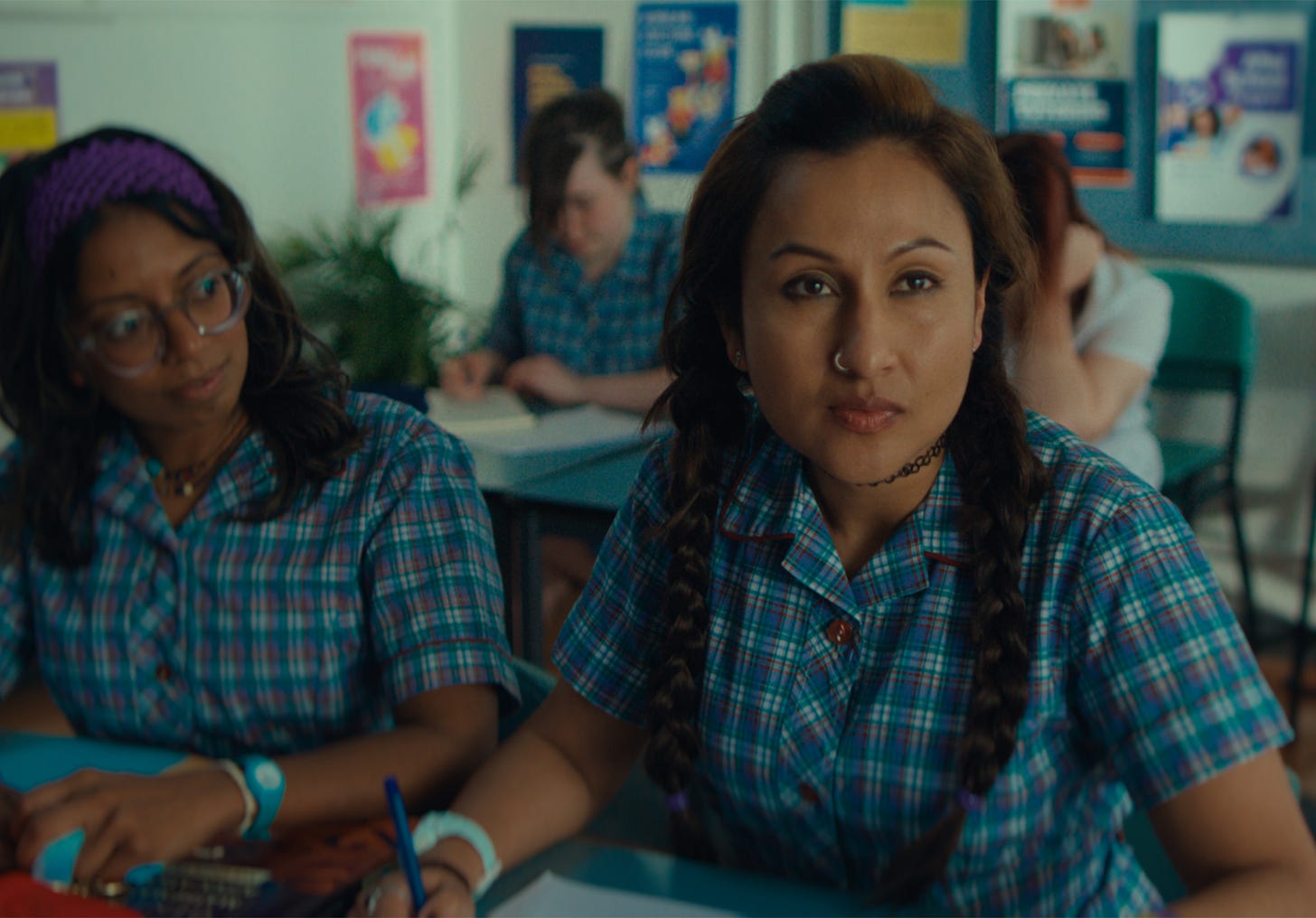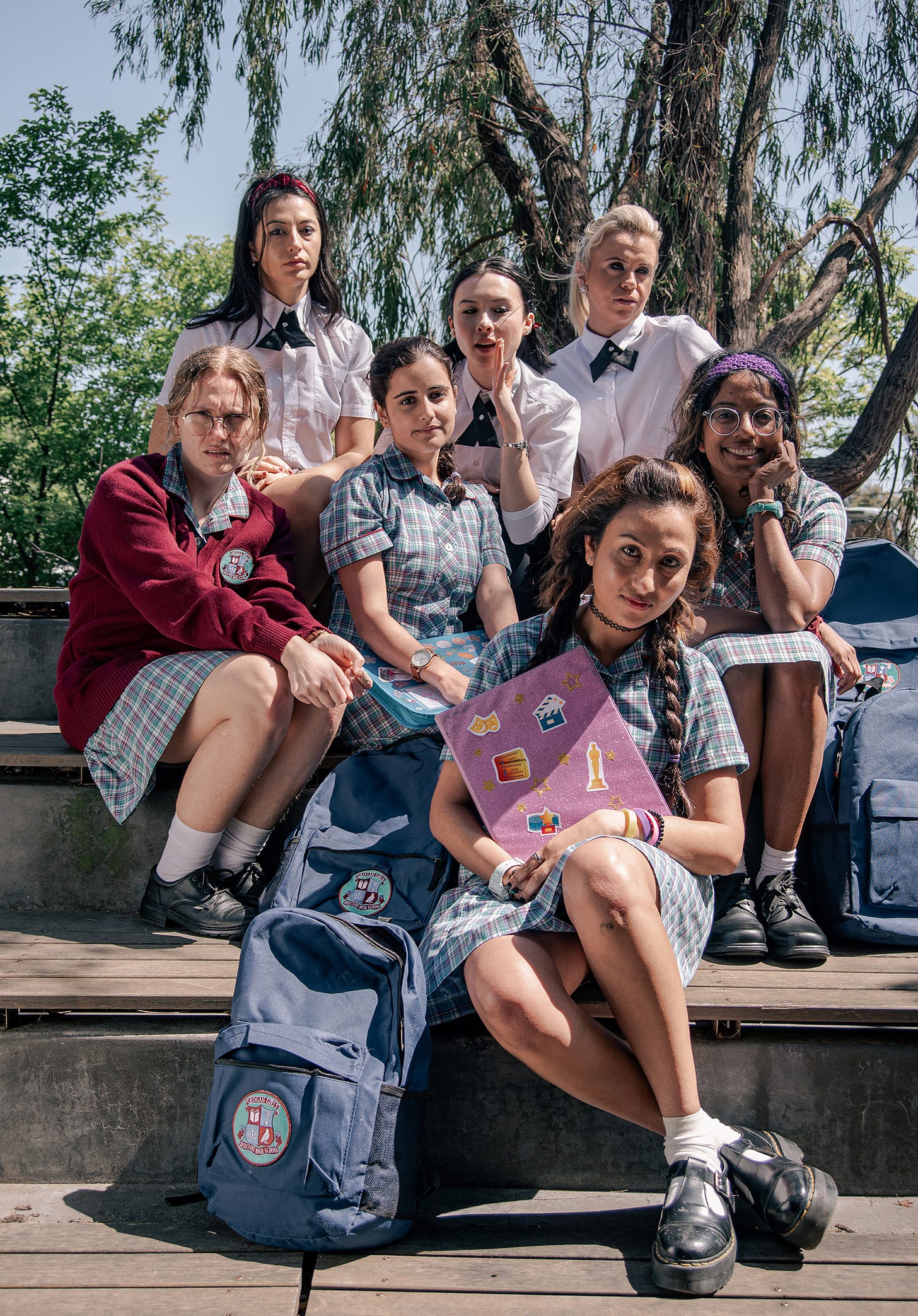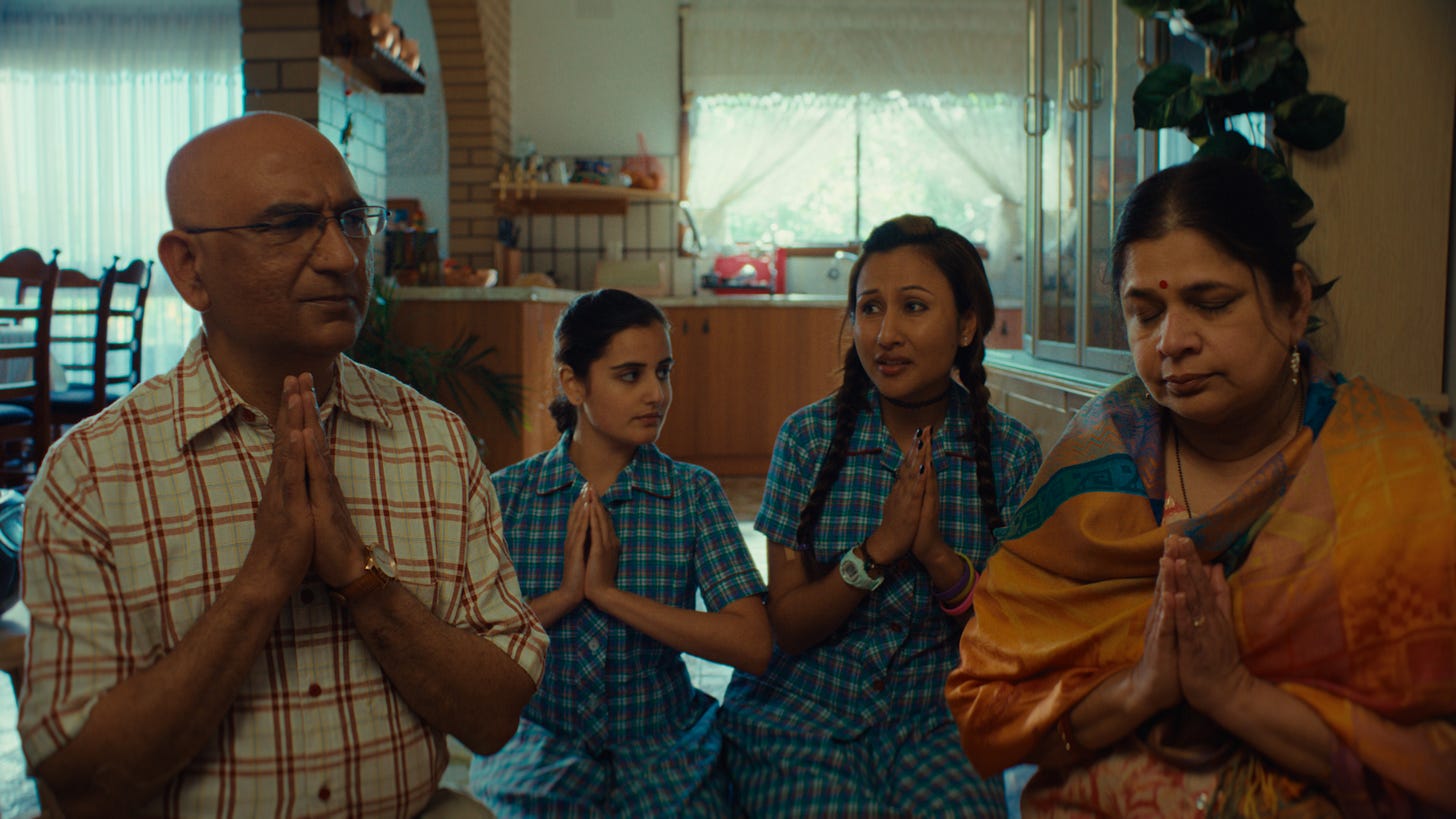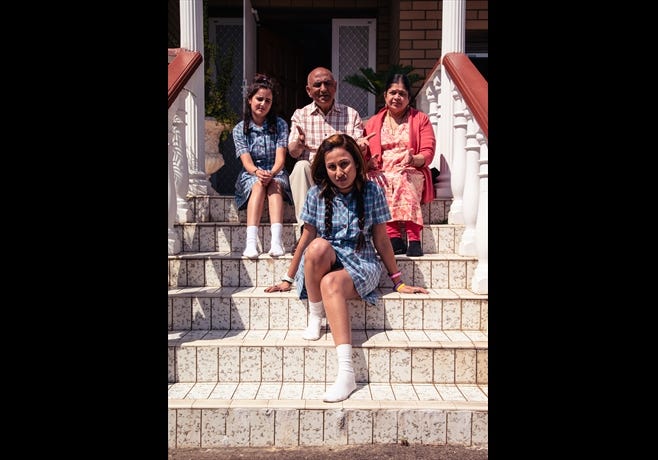The ABC’s Fresh Blood project is one of the best ways currently available for new TV talent to get their ideas on screen. One of the two pilots commissioned for Fresh Blood this year is Urvi Went To An All-Girl School, the brainchild of comic-writer-actor Urvi Majumdar, who stars as herself, and co-wrote the show with a little help from writer-director Nina Oyama (as an actor, known to viewers of Utopia, Deadloch et al) and writers Sashi Perera, Suren Jayemanne and Rohan Ganju. The show follows the misadventures of Urvi at high school in 2010, where she navigates the treacherous waters of high school, confronting bullies, teenage lust and the horrors of a precocious younger sister who has skipped a year to be in the same grade as she is. Meanwhile at home she must deal with parents who are hellbent on Urvi becoming a doctor, rather than her dream of being an actress.
I had the very great pleasure of some interview time with the marvellous Ms Majumdar, to talk about the pilot, all-girls schools, comedy and stuff like that.
BEN: Let’s begin by tracking the life of Urvi Went To An All-Girls School from its birth. When did the genesis occur? I mean, apart from at school, when you actually lived it.
URVI: I was doing stand-up…I’ve been doing stand-up since 2016 and I kind of saw that a lot of the stories were about school, so I had the idea for my first solo show to be about that. I was like, what should I call it? And it was the most basic title I could find, and that kind of stuck. And my first run of shows was really fun in Melbourne and it felt like it kind of worked. And then, yeah, Fresh Blood. I’d always kind of looked at it, I knew people who’d done it in previous rounds, but it’s so sporadic, the funding. But I always had a lookout for it, and and when it came out this time, I just applied with this idea. I had some help from Sophie Braham (Fisk, The Weekly, Gruen, many other of Australia’s finest TV), who helped me think of it as a show. And Nina came on board. So in 2023, after doing the (live) show for like two years, I applied, and I guess it grew from there.
BEN: So it started out as stand-up storytelling and it’s evolved into what we see before us. With the help of Fresh Blood.
URVI: And it’s (Fresh Blood) just been the best process, honestly. I know it’s got its challenges - the first bit of funding isn’t really enough to pay everyone properly, but I feel like it’s honestly been the best thing. It’s been a complete privilege to be part of the program. And it really taught me what I don’t know about screenwriting as well. I’m excited to start learning about it now.
BEN: Did you know Nina Oyama previously?
URVI: She’s with my management, Buxstock Management. And I remember when I first signed with them, I was like, pretty much, her career is what I’d love to do. She’s so talented in screenwriting. So we became super close from working on this project.
BEN: The show is about you, starring you as yourself. But how autobiographical is what we see on the screen?
URVI: It’s pretty much all based off real events. Like the pilot is about auditioning, she wants to be an actor, and the audition goes really badly. It’s from the actual experience I had auditioning for my high school musical. I remember just, like, crying. And then they let me have a chorus part.
BEN: So the crying was the key, that got you into the show?
URVI: Well, because the schools that we went to were so intense. There was, like, a hundred girls that auditioned. You had to stand in a circle, and then fifty got tapped on the shoulder and you had to leave. I got down to the final twelve, I think, and there were six spots. And when they tapped me on the shoulder, I burst out crying. And they let me audition again. And they’re like, you got in not because you cried, but because we can tell you’re trying really hard. And all that was to become Islander Number Seven in South Pacific, which is, like, the most racist kind of musical there is. That’s what really happened. But when we were writing, we were like, what’s more Australian? Nicole Kidman (in the show Kidman is referred to as an ex-student of Urvi’s school Grogan Girls High) actually went to (Oyama’s school) North Sydney Girls. And we were like, you know, Moulin Rouge seemed like a cool kind of nod to Australian musicals.
BEN: What was your school in reality?
URVI: In reality it was Mac.Rob in Melbourne (Mac.Robertson Girls High School), which nobody ever knows what it is, but it’s a selective girls’ high school. It’s in the Albert Park. But it was just a lot of funny things about this, when me and Nina shared stories because essentially our schools are very similar, just Melbourne and Sydney based, and we had such similar stories. Like the boys’ school always got more funding, so they went to a way more posh looking school and we literally got a full toilet block. I felt we hadn’t seen that side of schooling on Australian screens. So I thought that would be fun.
BEN: You and Nina seem to have been the perfect union because it sounds like you were very much on the same wavelength.
URVI: Yeah, it was like this weird synchronicity. And in the pilot, the girl who plays my sister actually also went to North Sydney Girls, which we didn’t know when she auditioned.
BEN: In the show, your sister skips a grade, resulting in the nightmare scenario of your little sister inhabiting the same year as you. In real life is your sister a prodigy?
URVI: She’s definitely higher achieving. She’s a diplomat, and she just finished her PhD, and she got the Julia Gillard Scholarship. She was just really smart. But in the show we thought it would be funny if, what’s the most annoying thing that can happen when you’re trying to be cooler than your sister - for her to skip ahead and be in the same grade as you. And just logistically it made sense, it meant that the scenes they’re in class, they could just be together.
BEN: In the show, your sister allies herself with a gang of bullies, the elite mixed-race girls. Were those characters based on real people, or real experiences?
URVI: Maya, my sister’s character is kind of loosely based on Nina’s experiences as well. In our schools there weren’t really any bullies, all the girls were pretty nice - it was more like you terrorised yourself questioning whether you were smart or not. But we did have an elite group of girls who were like, if you’re mixed race you were just hotter than anyone else. And then there was also a gangster group in my school who shoplifted and did that kind of hardcore stuff. So it’s loosely based on girls that we knew.
BEN: And your parents - how true to life are they in the show?
URVI: So like, the pornography line that the mum says, my mum didn’t say that. That’s kind of based off…there’s always, like, I feel in the Indian communities, it’s very Bend It Like Beckham. It’s like, so and so’s kid’s doing amazing, and then you have them on Instagram and you see their stories and they’re just literally taking drugs in Europe or whatever, and you’re just like, shut up. You don’t know the real them. But then my parents…I mean, my dad loves reading - at the end of the pilot he’s reading a book called How To Raise Successful Daughters, literally the kind of book my dad reads. So the parents are pretty based at the moment, and in the pilot it’s pretty much, like them.
BEN: And like in the show, did you feel that pressure as a kid, to not chase your dreams?
URVI: Yeah, absolutely. Well, because people always talk about combating racism in the industry and stuff, which is really important, but I always felt like the first battle I faced is…it’s really hard because it’s with your own community, or your own family. And they’re not doing it to be mean or anything. They’re just scared, which is fair enough. But there are so many memories…we had so many dramatic moments of my auntie coming over and sitting me down and being like, “this isn’t going to happen. You need to give up. No one wants an Indian Cinderella!” Just so many times, at every step of the way, it felt like this massive battle when I was underage and not having my own resources.
BEN: Is that a very Indian thing, or a very Asian thing or an immigrant thing in general, do you think, for parents to be like that?
URVI: It’s hard to generalise, because I don’t know, but pretty much the Indian community, or the one I was in, was very much like what it’s like in Bend It Like Beckham. But now, weirdly, now that I’ve gotten some success, they’re just like yeah, come do it, I’ll do a gig for my parents.
BEN: You’ve been embraced.
URVI: But I think all my friends still grew up watching Bollywood and stuff. My family prides itself on being very educated so they were like, Bollywood’s trash and you’re not watching it. My mum loved Bengali films and Satyajit Ray and stuff like that, which is much better. But it just meant I was more emo, I think.
BEN: In the show you’re a schoolgirl yearning to be an actor like Nicole Kidman. Now you’re living that dream, but you came to it through comedy. When did you decide that you wanted to be a comedian?
URVI: I remember, I was trying…I think I burned myself out in year 10, because Mac.Rob is a really special place in that you feel you can be yourself and if that’s nerdiness, you can take it to the extreme. Unfortunately for my parents I took that determination and decided I was going to teach myself acting. So I copied out this 300-page acting book by hand during maths class and then just tried to work faster, to pay for acting lessons and stuff like that. But I was just so tired and I remember being at a weekend acting class and they had an acting teacher, and they said, he’s an experienced actor who is going to come and talk to you about the industry. And the first thing he said was, have a Plan B. Like, I’ve done 25 car ads and that’s really successful in my field. And that scared me a little bit. And also - me and Nina spoke about this as well - at that time the industry was really white. I always felt like an outsider, when we went to the Melbourne Theatre Company or the Arts Centre, there were pretty much no brown people.
So comedy…I actually didn’t do any acting for a few years while I did my arts degree, and then when I was first year teaching, I was going through a breakup and I was trying to write really sad poems. I did a comedy workshop just because I wanted to give it a go. With Wes Snelling as teacher, this random weekend workshop. And then I didn’t even know stand-up was a thing you could do in Melbourne. And I just kind of became addicted to it. I just did it to have confidence in the first place, I never thought I’d be a comedian, that bit was a complete surprise. But it’s just been so much fun!
